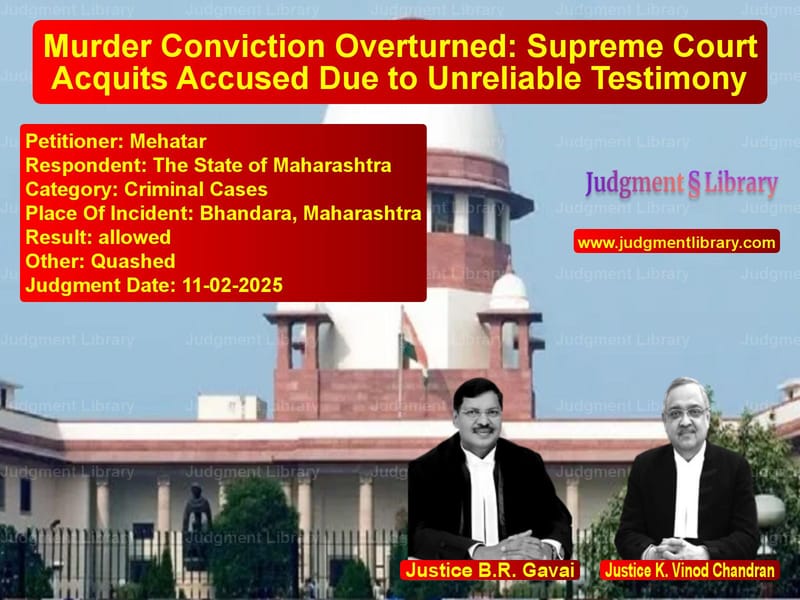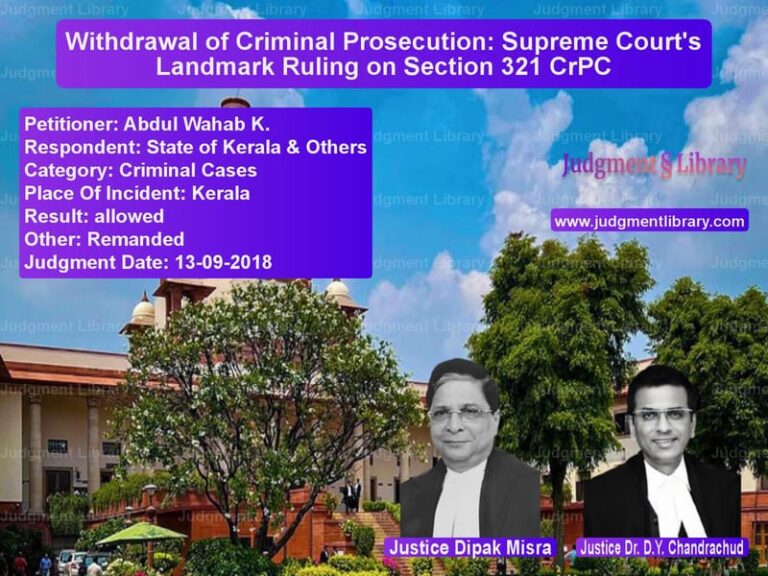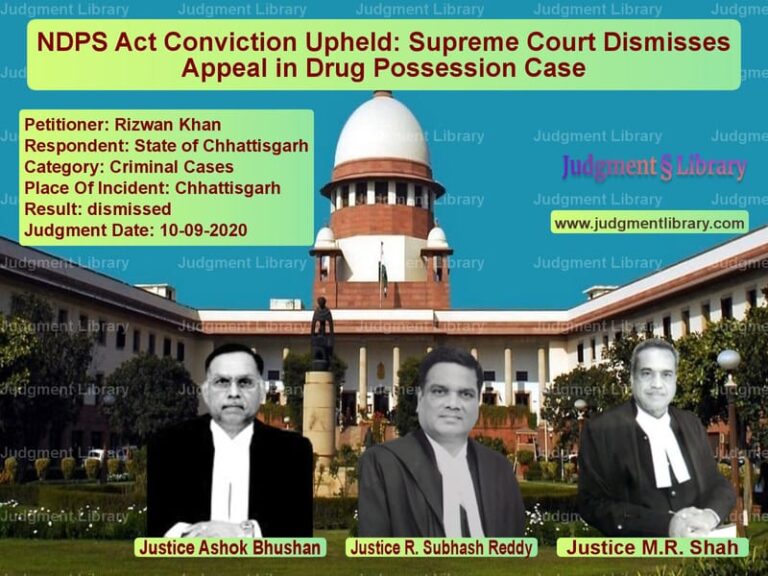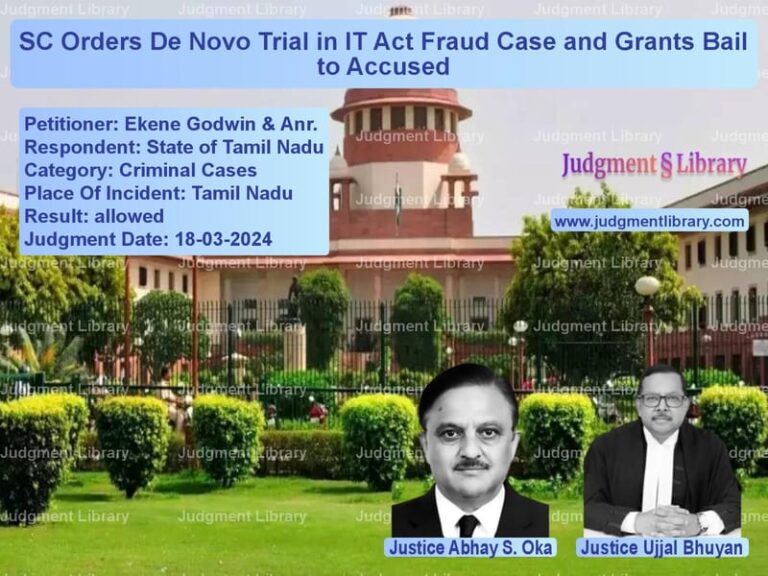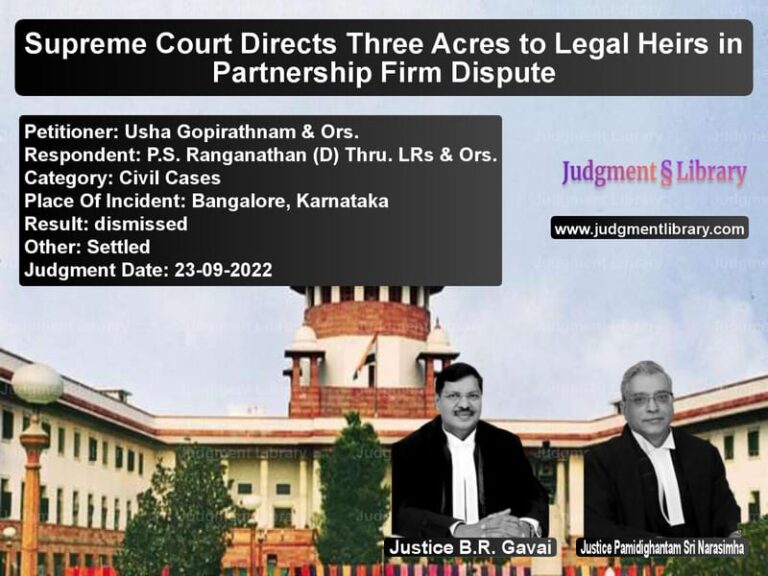Murder Conviction Overturned: Supreme Court Acquits Accused Due to Lack of Evidence
The case of Abdul Wahid & Anr. vs. State of Rajasthan and Abdul Shakur vs. State of Rajasthan is a landmark judgment where the Supreme Court overturned the murder convictions of the appellants due to lack of reliable evidence. The ruling emphasizes the importance of witness credibility, procedural correctness, and proper forensic examination in criminal trials.
Background of the Case
The appellants, Abdul Wahid, Babu, and Abdul Shakur, were convicted for the murder of Ahsan Ali in an incident that occurred on June 25, 1988, near Ghantaghar, Kota, Rajasthan. The prosecution alleged that the accused, along with others, ambushed and fatally stabbed the victim due to previous enmity.
The key timeline of events is as follows:
- June 25, 1988 (12:35 AM): Faeem Ahmed lodged the first information report (FIR No. 48/1988) at Maqbara Police Station.
- June 25, 1988 (Night): Ahsan Ali succumbed to injuries, leading to the addition of Section 302 IPC to the charges.
- March 10, 2003: The Additional Sessions Judge No. 4, Kota, convicted the accused under Sections 302/148 IPC and sentenced them to life imprisonment.
- August 26, 2011: The Rajasthan High Court upheld the convictions but modified the charges to Sections 302/149 IPC.
- February 28, 2025: The Supreme Court overturned the conviction, citing insufficient evidence.
Petitioners’ Arguments (Defense)
The defense argued that the conviction was based solely on the testimony of PW-1 (Faeem Ahmed), a highly unreliable witness:
- PW-1 was a stock witness used by the police in other criminal cases.
- He had criminal antecedents and pending cases against him.
- There was no independent corroboration of his testimony.
- The alleged recovery of weapons was dubious, and no forensic examination was conducted.
The defense counsel argued:
“The entire case is based on the sole, uncorroborated testimony of an interested witness. His credibility is severely compromised, and there is no forensic evidence linking the accused to the crime.”
Respondents’ Arguments (Prosecution)
The prosecution maintained that:
- The murder was witnessed by PW-1 and other prosecution witnesses.
- The FIR was lodged promptly, and the accused were named.
- The post-mortem report corroborated the injuries described in the witness testimony.
- The weapons used in the crime were recovered from the accused.
The prosecution argued:
“The sequence of events, eyewitness accounts, and medical evidence clearly establish the guilt of the accused. The minor inconsistencies in witness statements do not weaken the prosecution’s case.”
Supreme Court’s Observations
The Supreme Court meticulously examined the evidence and found serious procedural and evidentiary flaws. Key observations included:
- The sole eyewitness, PW-1, had a history of being used as a police witness and had criminal cases against him.
- The absence of forensic evidence on weapons and the crime scene raised doubts about the authenticity of the alleged recoveries.
- The seizure of weapons was not done in compliance with legal procedures, and no bloodstains were found.
- The police did not seize the motorcycle on which the victim was allegedly attacked, a critical piece of evidence.
- The testimony of other witnesses was inconsistent, and many turned hostile.
- Despite claims of a large crowd at the crime scene, no independent witnesses came forward.
The Court ruled:
“In a criminal case, the prosecution must establish guilt beyond a reasonable doubt. In this case, the evidence is unreliable, the sole eyewitness lacks credibility, and procedural lapses cast serious doubt on the fairness of the trial.”
Final Judgment
The Supreme Court ruled in favor of the appellants:
- The convictions under Sections 302/149 IPC were set aside.
- The appellants were acquitted of all charges.
- Their bail bonds were discharged, and they were not required to surrender.
The Court concluded:
“When the evidence against the accused is tainted with suspicion and inconsistencies, the benefit of the doubt must go to the accused. Convictions cannot be sustained on weak and uncorroborated testimonies.”
Conclusion
This judgment reinforces key principles of criminal law:
- Eyewitness credibility is crucial, especially when they are the sole basis of conviction.
- Forensic evidence plays a vital role in corroborating allegations.
- Convictions must be based on reliable and legally admissible evidence.
- The burden of proof rests on the prosecution to establish guilt beyond reasonable doubt.
The Supreme Court’s decision highlights the importance of fair trials, ensuring that no person is wrongfully convicted based on weak evidence.
Petitioner Name: Abdul Wahid, Abdul Shakur.Respondent Name: State of Rajasthan.Judgment By: Justice Pankaj Mithal, Justice Ujjal Bhuyan.Place Of Incident: Kota, Rajasthan.Judgment Date: 28-02-2025.
Don’t miss out on the full details! Download the complete judgment in PDF format below and gain valuable insights instantly!
Download Judgment: abdul-wahid,-abdul-s-vs-state-of-rajasthan-supreme-court-of-india-judgment-dated-28-02-2025.pdf
Directly Download Judgment: Directly download this Judgment
See all petitions in Murder Cases
See all petitions in Attempt to Murder Cases
See all petitions in Fraud and Forgery
See all petitions in Theft and Robbery Cases
See all petitions in Judgment by Pankaj Mithal
See all petitions in Judgment by Ujjal Bhuyan
See all petitions in allowed
See all petitions in Quashed
See all petitions in supreme court of India judgments February 2025
See all petitions in 2025 judgments
See all posts in Criminal Cases Category
See all allowed petitions in Criminal Cases Category
See all Dismissed petitions in Criminal Cases Category
See all partially allowed petitions in Criminal Cases Category

